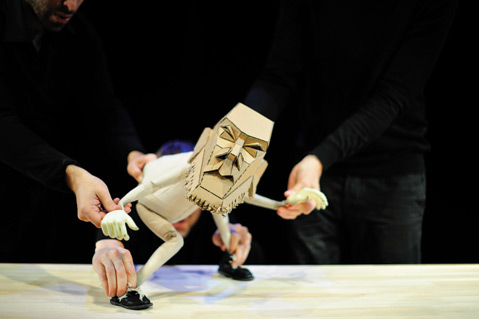Mark Down Channels Samuel Beckett in a Puppet
Blind Summit Theatre Presents The Table at UCSB’s Campbell Hall

What’s the difference between a puppet and an actor? Mark Down, artistic director of the London-based Blind Summit Theatre, has spent many years working with both, and he has made some insightful discoveries along the way.
“A puppet is instantly appealing, almost in the opposite way of an actor,” he said. “In the best situations, an actor onstage grows on you as you get to know them. With a puppet, it’s immediate candy, but the interest passes.
“One of the things we have found is the more the puppet says, ‘I’m just a puppet — none of this is real,’ the more interesting things become. Audiences grow more and more attached to him the more he protests that they shouldn’t. It’s a sort of paradox.”
So prepare to grow unnaturally attached to Moses, the Blind Summit creation who will make his West Coast debut on Wednesday, November 6, in UCSB’s Campbell Hall. He is the focus of the critically acclaimed one-puppet show The Table, which will be presented by UCSB Arts & Lectures for three nights next week.
Moses is “one part British stand-up comic, and one part Beckettian hero,” in the words of Chicago Tribune theater critic Chris Jones, who loved the show. If neither of those aspects sounds particularly child-friendly, it’s for good reason: This is puppet theater for adults.
“He explains how he works and gets more and more entangled in a puppet existential crisis,” explains Down, who provides Moses’s voice and manipulates his head. Two additional puppeteers manipulate his feet and body; all are fully visible, in the traditional Bunraku style.
But if the style is traditional Japanese, the content is something much more modern — or, perhaps, post-modern. Moses is a puppet who possesses self-knowledge and poses unanswerable questions. As Jones aptly observed, he would feel right at home in a Samuel Beckett play.
And why not? How better to embody the fleeting nature of existence than through an object who only springs to life sporadically, at the mercy of forces he cannot control?
“Beckett was quite keen on puppets — a fact we stumbled upon later,” Down said. “[In his plays] there is constant talk about being and embodiment: Where am I, what am I, who am I?”
Yet the Waiting for Godot author was far from the creators’ minds when they embarked on this project several years ago. Down and Nick Barnes, the company’s cofounder, originally created Moses for use in their puppet adaptation of George Orwell’s 1984.
“He turned out to be too cute, so we didn’t use him,” Down recalled. “Three or four months later, we got a commission from the Jewish Community Center to make a piece for the Passover Seder, so we got this puppet out again and spent a week in a room [working with it].
“We discovered that a puppet standing on a table and talking about being on a table has an amazing Waiting for Godot quality. From there, it grew and grew. It began as a loose pastiche of Pinter and Beckett. We didn’t read Beckett until about a year later! We tend to do the research second.
“We did about 15 minutes and put it aside for a year. Then we got the opportunity to go to [the] Edinburgh [Festival Fringe], and we decided to develop it further. At first, the Beckett was just a brush-on, but when we tried to work it up into a bigger piece, we thought we’d better work out how Beckett did what he did.”
And what did they learn? “It gets more and more mystifying the closer you look! The key for us was discovering the musical routines that underpin his writing. You can almost see it as vaudeville routines with misfiring punch lines.”
The show has continued to evolve since those highly successful Fringe Fest performances in 2011. “We get drawn into new improvisations based on how the audience is reacting,” Down explained. “If we like them more than the other stuff, we’ll keep it in. Whether we’re making it better or chasing our tails, I don’t know.”
Down and Barnes founded Blind Summit Theatre in 1997. A medical school graduate who decided he’d rather spend his life on stage than in a hospital, Down met Barnes in a workshop, where Barnes was experimenting with telling an old Chinese man’s life story through the use of a life-size puppet.
“We hit it off very quickly,” Down said, “but the company developed very slowly. We figured it out together. There was hardly any puppetry for adults in London at the time. We’d see a puppet show once a year, when one came to London from Poland or somewhere. We’d think, ‘We must be better than that,’ and then put something together that was much, much worse. But very gradually, it came together.”
In the process, they found another difference between actors and puppets.
“One of the things we discovered is that a puppet can pause, and then break a pause, in a way actors can only dream of,” he noted. “We stumbled across that. When a puppet stops, it really stops.”
4•1•1
UCSB Arts & Lectures presents Blind Summit Theatre’s The Table at UCSB Campbell Hall on November 6, 7, and 8. All shows are at 8 p.m. Call (805) 893-3535 or visit artsandlectures.sa.ucsb.edu for tickets and info.



